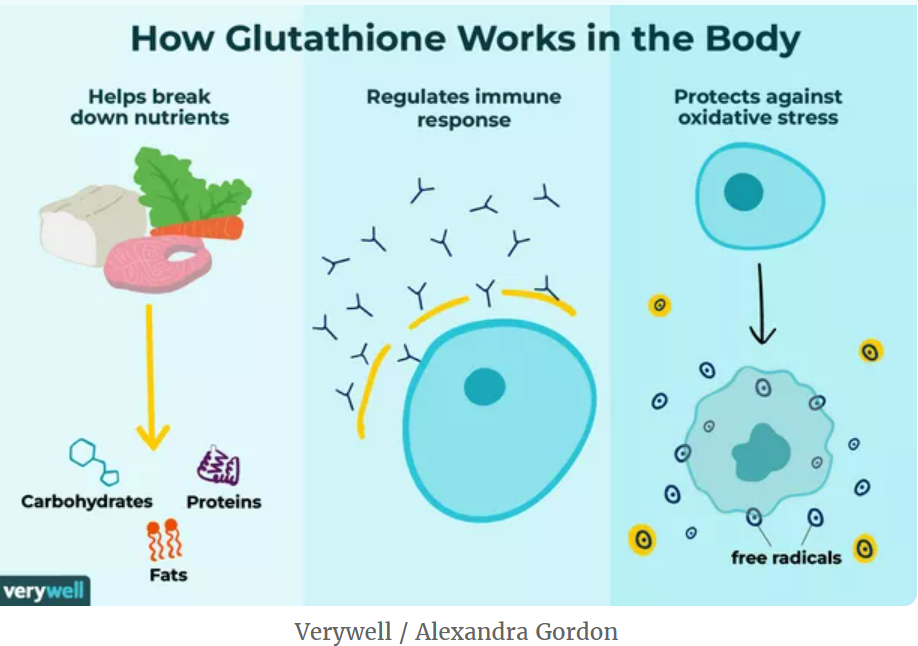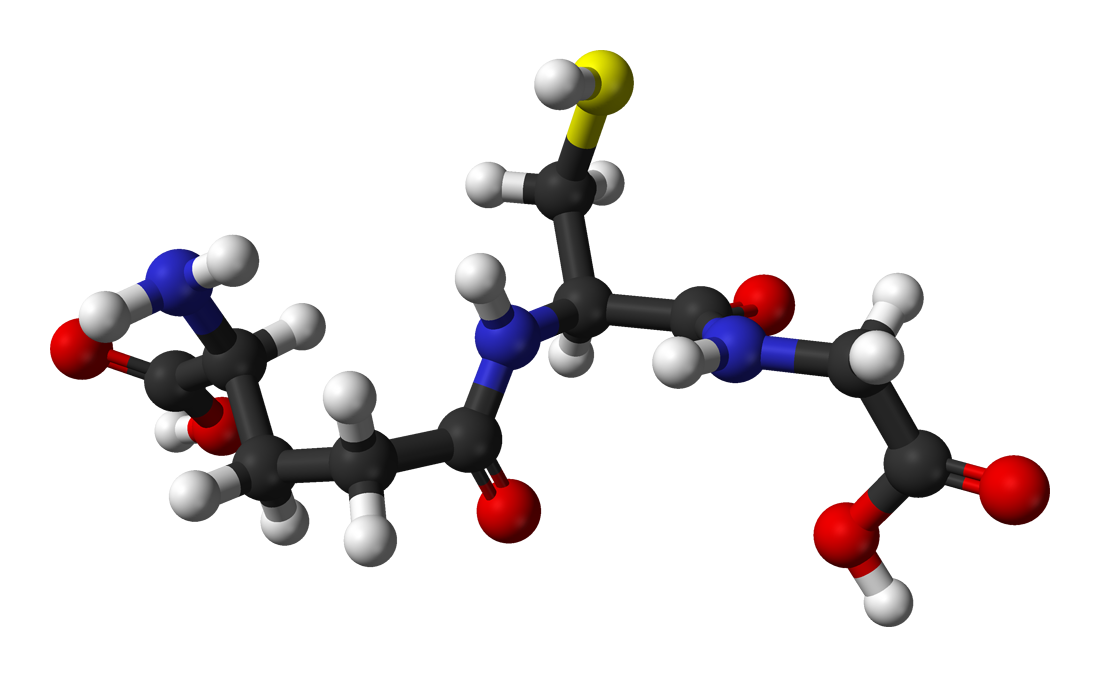Glutathione, also known as GSH, is a molecule found naturally in your body. It is produced by the liver and nerve cells in the central nervous system. Glutathione is made up of three amino acids: L-cysteine, glycine, and L-glutamate.
“If you look in a hospital situation at people who have cancer, AIDS, or other very serious disease, almost invariably they are depleted in glutathione,” says Dr. Jeremy Appleton, along with many top medical experts. “The reasons for this are not completely understood, but we do know that glutathione is extremely important for maintaining intracellular health.”
Glutathione and Inflammation
Inflammation is a highly complex biochemical protective response to cellular injury. If this process is continuously unchecked, it leads to chronic inflammation, a hallmark of various inflammatory lung diseases.
Reactive oxygen intermediates generated by immune cells recruited to the sites of inflammation are a major cause of cell damage. Glutathione (GSH), is a vital intra- and extracellular protective antioxidant in the lungs.
Biotech Stock Review: Revive Therapeutics Announces Entry Into Phase III FDA Trial Using Glutathione Boosting Bucillamine.
American Chemical Society: Endogenous Deficiency of Glutathione as the Most Likely Cause of Serious Manifestations and Death in COVID-19 Patients
Basic Video: Glutathione Detox: The Science of Glutathione
Basic Video: Glutathione: The “Mother” of all Antioxidants…
Glutathione, N-Acetyl-L-Cysteine (NAC), Fish Oil, Alpha-lipoic Acid, B-6, B-12, , Selenium, and Milk Thistle, and you’re good to go!

Technical Video: What Happens If I Can’t Get N-Acetyl Cysteine (NAC)?
Technical Video: Glutathione, Oxidative Stress and N-Acetylcysteine (NAC) in Psychiatric Disorders
AMERICAN CHEMICAL SOCIETY
Glutathione (pronounced “glue-tuh-thigh-own”) is an antioxidant best known for protecting cells and tissues from oxidative damage. (9) The body produces this important antioxidant on its own; however, age, poor lifestyle habits, and other factors can diminish glutathione levels, leaving you more vulnerable to infection and chronic inflammatory conditions.
What is glutathione?
Arguably the most important antioxidant in the body, glutathione protects cells from the damaging consequences of reactive oxygen species, toxins, and heavy metals. (10)(11)(14) Sometimes referred to as the “master antioxidant,” glutathione is produced endogenously, meaning it is synthesized by the body. Glutathione synthesis requires three amino acids, which include glutamate, cysteine, and glycine. (11)
In your cells, glutathione exists as either reduced (GSH) or oxidized (GSSG) glutathione. The ratio between these two forms serves as an indicator of cellular health. In healthy individuals, the ratio between GSH and GSSG is close to 1:100. In contrast, cells experiencing oxidative stress will have increased oxidized glutathione and a ratio of 1:10. (27)
Maintaining high glutathione concentrations and an appropriate GSH/GSSG ratio has been shown to not only protect cells from oxidative stress and damage but prevent tissue degeneration and slow disease progression as well. (11) Numerous factors can negatively influence glutathione production, including poor diet, (11) infection, aging, (37) and toxin exposure. (27)
Benefits of glutathione
Thanks to its cytoprotective (cell protecting) effects, glutathione may delay or slow the progression of certain chronic diseases. (11) Although much of the research examining the effects of glutathione is conducted in animal subjects, existing research suggests that glutathione has a significant effect on immune health and various chronic conditions. (18)
Supports immune system function
Glutathione plays an essential role in regulating the innate immune system, the body’s first line of defense against harmful pathogens. (10) It promotes a robust immune system by protecting host immune cells from oxidative damage and supporting the activity of lymphocytes and other immune cells in the body. (29)
Much of the scientific literature concludes that low levels of glutathione can have detrimental effects on the immune system, including increasing an individual’s susceptibility to infection. Even small changes in glutathione levels can have significant implications on immune cells and immune system function. (5)
Some research has indicated a connection between diminished glutathione levels and susceptibility to viral infection, such as the flu. (10) In vitro and in vivo studies also suggest that glutathione may exert antiviral effects. (2)(24)
Furthermore, glutathione has the potential to reduce the severity of symptoms related to various autoimmune conditions, such as rheumatoid arthritis, celiac disease, and lupus. (8)(15)(32) According to one study, glutathione supplementation reduced oxidative stress and inflammation, two factors that contribute to autoimmune conditions. (26)
Did you know? Glutathione has been shown to help with the treatment of HIV and AIDS by replenishing glutathione levels and improving immune system function. (4)
Reduces inflammation
Increased oxidative stress is directly linked to increased inflammation and risk of numerous chronic conditions. (11) Glutathione is believed to inhibit the inflammatory response and prevent the production of inflammatory cytokines that can contribute to chronic disease. (10)
When glutathione levels are too low, oxidative stress can cause harm. Glutathione depletion, not to be confused with the rare genetic condition glutathione synthetase deficiency that prevents the body from producing glutathione, (34) may contribute to the following conditions:
- Alzheimer’s and Parkinson’s disease
- Cancer
- Chronic obstructive pulmonary disease (COPD)
- Cystic fibrosis (10)
- Heart disease
- HIV and AIDS
- Liver disease
- Obesity
- Protein-energy malnutrition (PEM)
- Type 2 diabetes (11)
National Institute of Health (1999): Inflammation and the regulation of glutathione level in lung epithelial cells
#RVVTF, $RVVTF












